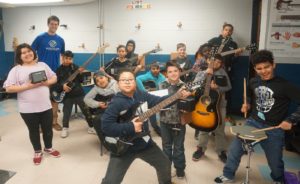Here are some of the results from the recent (2023) National Youth Outcomes Initiative report, based on responses from over 150 Boys & Girls Club of Greater Lowell members.
96% of Club youth believe adults at the Club care about them.
Why is this important: Social connections with caring adults, especially “SNPA” (Supportive Non-Parental Adults) has been identified as a key component of positive youth development, especially for young people of color, and those living in low income households.
95% report feeling that the adults at the Club believe they will be a success.
Why is this important: Many youth who grow up in poverty remain there due to low expectations from adults in their lives and society. Having adults in their lives who share high expectations for success encourages youth to believe in themselves and their ability to achieve their dreams, an important step towards ending generational poverty.
79% expect they will have some form of post-secondary education (college, jr. college or trade school).
Why is this important: Education, including finishing high school and completing some sort of post-secondary education, sets young adults up to be financially independent later in life.
78% of Club teens have performed some type of volunteer service in the past year
Why is this important: Only about 30% of teens nationwide perform volunteer work in a given year. Doing good for others promotes a sense of accomplishment which, in turn, boosts self esteem and gives a sense of purpose. Studies have shown volunteering can increase happiness and reduce stress. Volunteering gives you the opportunity to practice important skills used in the workplace, such as teamwork, communication, problem solving, project planning, task management, and organization.
90% of Club members say they regularly avoid risky behaviors.
Why is this important: The desire to look cool, lack of complete brain development and boredom often lead young people to make bad choices and try risky behaviors. These behaviors might include unprotected sexual activity, smoking or vaping, use of illegal substances, and fighting. Being confident in their refusal skills (avoiding risky behaviors) helps young people avoid costly outcomes associated with these risky behaviors that can impact their future.
Sources:
National Youth Outcomes Initiative
Supportive Non-Parental Adults and Adolescent Psychosocial Functioning
Good News for Youth: At Least 9 in 10 Have Supportive Adults in Their Lives.
The Current Landscape of Adolescent Risk Behavior




